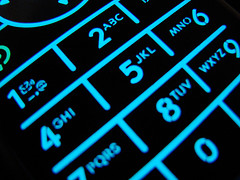
Three foundations have joined forces in an effort to provide better healthcare through the use of cell phones and computer technology. In particular, these mobile technology initiatives are aimed at improving healthcare services in developing countries.
Cell phones are currently being used for health services ranging from HIV/AIDS education to reminding people to get vaccinations. Last week the Rockefeller Foundation, the United Nations Foundation, and the Vodafone Foundation said that they will be encouraging such projects through the formation of the Mobile Health Alliance (or mHealth Alliance for short). The alliance, announced at the Mobile World Congress, will facilitate projects that use mobile technology for health purposes and work with public and private groups to further these initiatives. The plan is to leverage the widespread use of mobile phones in developing countries – 64 percent of cell phone users are in the developing world.
Erik Hersman, blogging on White African, discusses how mobile health services are all the rage now among foundations and non-profits, while the Social Justice Blog applauds the move, saying:
“This is the kind of corporate social responsibility that's great to see — technology answering a pressing social need…mHealth Alliance uses the technology to provide virtual doctors to those living in rural areas, particularly in India, Uganda and South Africa.”
The mHealth Alliance also released a report at the conference called mHealth for Development, which surveys programs in developing countries that are using mobile technology to promote public health. The report examines 51 programs that are underway or will be implemented in the near future in 26 countries, and shows that these programs are more prevalent in India, South Africa, Uganda, Peru, and Rwanda. 3G Doctor Blog lists all 51 projects and elaborates on the report:
“I’m posting this from the Mobile World Congress in Barcelona at the launch of a report that attempts to define mHealth; outlines the potential for mobile phones to improve health in the developing world; identifies building blocks for successful, sustainable and scalable mHealth programs; demonstrates the incentives for multiple players in the ‘mHealth value chain’…it also issues a call for action to create an independent global body to encourage multi-sector and pan-regional collaboration to leverage the transformational power of mobile networks and devices to improve healthcare delivery throughout the developing world.”
The report highlights projects such as Project Masiluleke (or Project M) in South Africa, a SMS-based service that promotes an AIDS hotline and provides HIV/AIDS education. The SIMpill project is another program in South Africa; it uses a sensor-equipped pill bottle with a SIM card to advise healthcare workers if their patients aren't taking their tuberculosis medicine. The percentage of people keeping up with their medicine rose from 22 percent to 90 percent thanks to SIMpill, which is also being used in places such as Thailand. Another project called Cell-PREVEN has been launched in Peru. Mahmud Hussein describes the project on his site:
“Investments in mobile health initiatives such as the one undertaken recently in Peru called the Cell-Preven project should be made, in which a mobile health team, consisting of a small group of trained health professional and workers are dispatched to select communities. People there can get check-ups, on the spot screening for diseases such as malaria and tuberculosis, treatment of sexually transmitted infections as well as medical care for female sex workers. The teams are connected through satellite communications or internet/mobile phones (where available) to doctors in other areas, where information can be shared between the two teams and further assistance be given in real-time.”
Nick Hunn, blogging on Creative Connectivity, welcomes the mHealth report, saying that it shows the different ways in which mobile technology can be helpful.
“That’s why the ‘Doctor in your Pocket’ report is so welcome. It highlights the fact that there’s no one model that has to be followed. Each of the countries put forward as examples have very different dynamics and customer sets. In one the major user base is young men. In another it’s mothers. In all cases the users like the service and find it beneficial.”
Despite all this promise, some people remain cautious about mobile technology's potential to improve healthcare services. A comment on a post about the mHealth Alliance points out that this technology still can't replace the experience of being treated by a real live health practitioner. Arun Pal Singh says:
“Medical care is often incomplete without physical contact between doctor and patient. While it may seem to be slightly beneficial to use technology, developing countries would be most benefited by producing their own doctors and paramedics.
Nothing beats education.”
Photo of Mobile Phone Up Close by samantha celera on Flickr.







7 comments
This is a fantastic collaboration and the number and breadth of projects is great to see, partly because it will provide many seeds for future innovation and discovery in this area.
What I am curious about is why this alliance is being reported as being new – I thought that this was started last year or the year before. It would have been great to see the alliance discuss what they have accomplished over the last year.
Either way, I am looking forward to the future of all of these projects and learning from them.